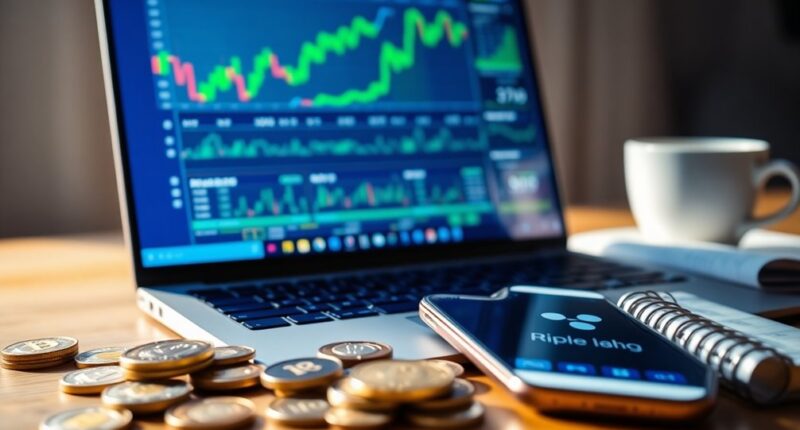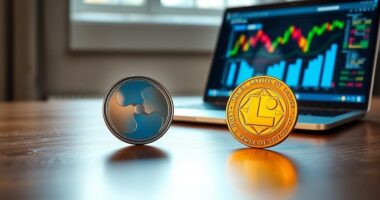To buy Ripple (XRP), start by picking a reputable cryptocurrency exchange like Coinbase or BitStamp. You'll need to create an account and verify your identity. Fund your account using a credit card or bank transfer. Once that's set, you can purchase XRP at market price or set a limit order to control your buying price. Keep an eye on transaction fees as they can vary by exchange. For security, consider moving your XRP to a hardware wallet. Interested in tips to maximize your investment and navigate potential risks? There's plenty more to explore!
Key Takeaways
- Select a reputable cryptocurrency exchange like Coinbase or BitStamp to create an account and start the buying process for Ripple (XRP).
- Complete identity verification by submitting a legitimate ID to comply with exchange regulations.
- Fund your account using credit cards or bank transfers to prepare for purchasing XRP.
- Buy XRP at the market price or set a limit order while being mindful of transaction fees.
- Consider using a hardware wallet for secure storage of your XRP after purchase.
Ripple Overview and Features
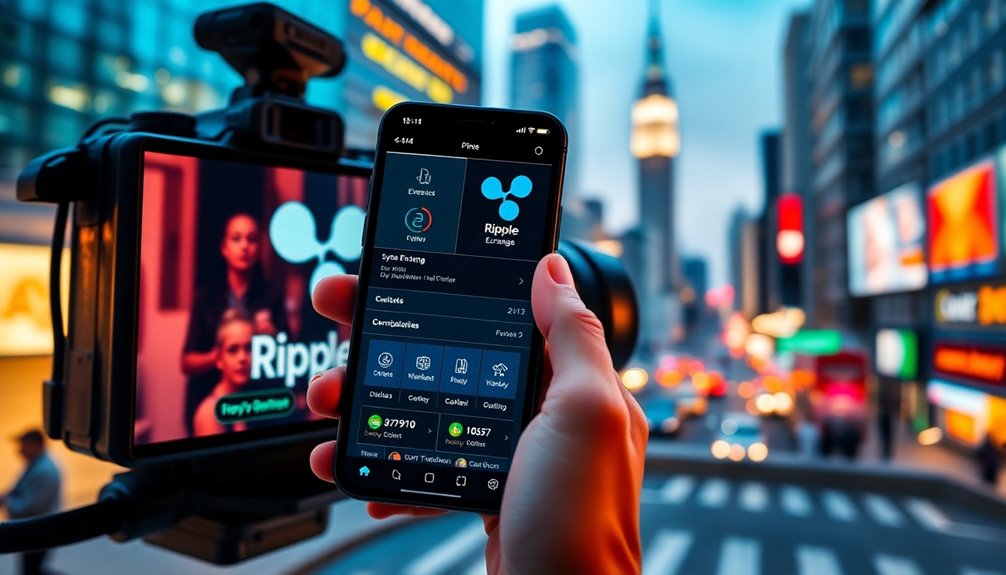
Ripple stands out as a revolutionary player in the digital payment landscape, leveraging blockchain technology to facilitate seamless cross-border transactions.
This blockchain-based company uses the XRP Ledger and its native cryptocurrency, XRP, to provide efficient financial solutions. Ripple's decentralized network features unique nodes and permissioned servers that validate transactions without the need for mining, ensuring fast processing times—often just seconds—with low fees. Ripple also assists nations in developing central bank digital currencies (CBDCs), which enhances its role in the evolving financial ecosystem.
It's designed for high throughput, handling thousands of transactions per second securely. Businesses benefit from Ripple's crypto liquidity services and the ability to create central bank digital currencies (CBDCs).
Buying Ripple: A Beginner's Guide

If you're new to the world of cryptocurrency, buying XRP can seem daunting at first.
Start by choosing a cryptocurrency exchange. Centralized platforms like Coinbase or BitStamp let you buy XRP with fiat currency. You'll need to create an account by providing your name, email, and country, then verify your identity with a legitimate ID.
Funding your account is next; you can use credit cards or bank transfers. Once your account is ready, purchase XRP directly at the market price or set a limit order. Remember to check transaction fees. Additionally, consider using a hardware wallet to secure your assets, as they enhance the protection of your private keys.
Finally, consider securing your XRP in a hardware wallet for added safety. With these steps, you'll be well on your way to owning Ripple!
Transaction Validation Process Explained
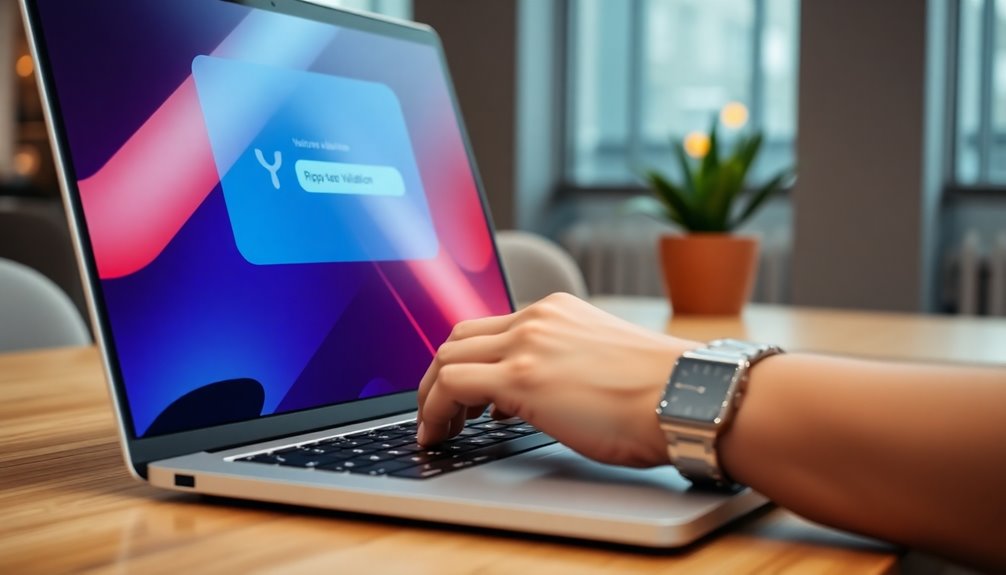
When you initiate a transaction in the XRP Ledger, it kicks off a detailed validation process designed to ensure the integrity and reliability of the network.
First, you create a proposal that includes the sender, recipient, and amount, which is then broadcasted for validation. Validators receive these proposals and check them against specific rules, ensuring you have enough XRP and preventing double-spending. They evaluate the proposals, communicate with each other, and must reach a consensus, with over 80% agreeing on the validity. This unique consensus mechanism, known as the XRP Ledger Consensus Protocol, streamlines the validation process, allowing for efficient transaction settlements.
Once consensus is achieved, your transaction is added to the new ledger version. This process ensures that your transaction is secure, immutable, and part of the tamper-proof XRP Ledger.
Pros and Cons Analysis

Considering the advantages and disadvantages of buying Ripple (XRP) can help you make a more informed decision.
On the plus side, XRP boasts lightning-fast transaction speeds, low fees, and strong partnerships with major financial institutions, making it an appealing option for cross-border payments. Its high security and efficiency enhance its attractiveness as a digital asset. Furthermore, Ripple's focus on low-cost international money transfers positions it as a competitive alternative to traditional banking systems.
However, centralization concerns arise since Ripple controls XRP, which may deter some investors. Additionally, ongoing regulatory uncertainty, particularly from the SEC, can impact market confidence and price stability.
Lastly, XRP's price volatility poses risks for long-term investors. Weighing these pros and cons will guide you in deciding whether Ripple is the right investment for you.
Ripple vs. Other Cryptocurrencies

Ripple stands out among cryptocurrencies, particularly when compared to giants like Bitcoin and Ethereum. With its ability to process 1,500 transactions per second and settle them in just 3-5 seconds, Ripple excels in speed and efficiency, making it ideal for instant global transactions.
Unlike Bitcoin's energy-intensive Proof-of-Work, Ripple uses a Federated Byzantine Agreement, significantly reducing energy consumption. While Bitcoin is known for its decentralization, Ripple operates on a hybrid model, with centralized control complemented by decentralized validation. This unique structure helps banks like Santander and Fidor Bank adopt Ripple for scalable international transfers. Additionally, Ripple has gained traction within the banking sector, establishing partnerships with various financial institutions. As Ripple continues to integrate into the financial system, its benefits over other cryptocurrencies become increasingly evident.
Regulatory Uncertainty in Markets

As the cryptocurrency market evolves, regulatory uncertainty poses significant challenges for investors and traders alike.
With multiple regulators potentially overseeing transactions, you might find it hard to navigate the legal landscape. The lack of clarity on digital asset classification often leaves decisions to the courts, which can create additional risks.
Both the SEC and CFTC are ramping up enforcement, pushing for clearer regulations, especially around consumer protections. This heightened scrutiny can impact the pricing and market stability of assets like Ripple (XRP). Additionally, the current stablecoin market is valued at nearly $130 billion, reflecting the increasing importance of regulatory clarity in the evolving crypto landscape.
If lawmakers don't define appropriate regulatory frameworks soon, you might see economic activity shift to more favorable jurisdictions, further complicating your investment decisions.
Staying informed about these dynamics is essential for your crypto strategy.
Market Adoption by Financial Institutions

While traditional banking systems face challenges in efficiency and costs, many financial institutions are increasingly turning to innovative technologies like Ripple's solutions.
Major banks like Santander and UBS are already utilizing RippleNet to streamline cross-border payments. With over 100 financial institutions on board, Ripple's network enables faster and cheaper international transactions, appealing to banks like Siam Commercial Bank.
Notably, American Express and J.P. Morgan Chase are leveraging Ripple's technology for real-time payments. The environmentally friendly aspect of Ripple's platform also attracts attention, promoting sustainability. Additionally, the fact that over 300 financial institutions have joined RippleNet highlights the growing trust in Ripple's capabilities.
As compliance standards evolve, Ripple meets the stringent requirements set by top global banks, further solidifying its presence in the financial landscape and enhancing the adoption of XRP in everyday transactions.
Set a Budget Limit
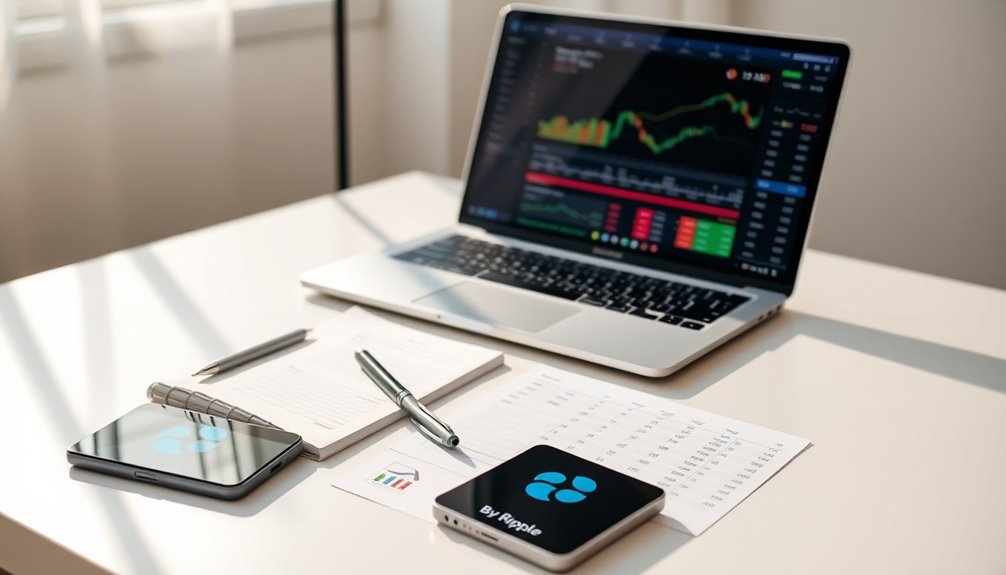
Setting a budget limit is crucial when planning to buy XRP.
First, remember that the XRP Ledger requires a minimum reserve of 20 XRP, which you can't withdraw or send elsewhere. This amount will be locked, representing a permanent cost for maintaining your wallet. Additionally, understanding the minimum reserve requirement can help you better plan your overall investment. Furthermore, consider the importance of digital asset management to effectively track and optimize your XRP investment.
Next, factor in transaction fees, which can vary by exchange and may include additional charges. If you're using a custodial or non-custodial wallet, those costs matter too.
Finally, consider potential price fluctuations and plan for long-term holding. Dollar-cost averaging can help mitigate volatility.
Frequently Asked Questions
Can I Buy Ripple Anonymously?
Yes, you can buy Ripple anonymously.
You can use specific exchange platforms like Changelly for smaller amounts without needing ID verification.
Alternatively, look into peer-to-peer exchanges, where you can negotiate trades directly with others.
Some methods, like using gift cards or cash deposits, help maintain your privacy.
Just keep in mind that larger purchases might still require some verification, so it's essential to check the platform's rules first.
What Payment Methods Are Accepted for Purchasing Ripple?
When you're looking to purchase Ripple, you've got several payment methods at your disposal.
You can use bank transfers through platforms like Paybis, which allows ACH transfers.
Credit and debit card purchases are available via ChangeNOW, and exchanges like Binance support multiple payment options including cards and transfers.
BitStamp requires a fiat deposit, offering a secure way to buy.
Each option caters to different preferences, ensuring you find one that suits your needs.
How Long Does It Take to Buy Ripple?
Buying Ripple can feel like a lightning bolt—quick and efficient.
Once you've set up your account and linked a funding source, you can purchase XRP almost instantly. Typically, transactions on the Ripple network process in about 3-5 seconds.
However, keep in mind that factors like network congestion or exchange issues might cause delays. Always ensure you're using a secure platform to enjoy smooth and speedy transactions.
Is Ripple Available on All Cryptocurrency Exchanges?
No, Ripple isn't available on all cryptocurrency exchanges.
While you can find XRP on popular centralized platforms like Coinbase and Kraken, some exchanges may have regional restrictions.
For instance, Huobi Global and Bitfinex limit access to non-U.S. users.
Decentralized exchanges also offer wrapped XRP, but availability can vary.
Always check the specific exchange to see if they support XRP and understand any local regulations that might affect your access.
Can I Store Ripple in a Hardware Wallet?
Absolutely, you can store Ripple in a hardware wallet!
Because who wouldn't want their precious digital assets locked away in a safe, far from the clutches of cyber gremlins?
Ledger and Trezor offer solid options, keeping your private keys securely stored and your assets safe from pesky malware.
With user-friendly designs and top-notch security features, you'll feel like a crypto vault owner.
Conclusion
In conclusion, buying Ripple can be an exciting venture, especially since it's backed by over 300 financial institutions worldwide. With its unique transaction speed—averaging just 3-5 seconds—you'll appreciate how it stands out in the crowded crypto market. Remember to set a budget limit and stay informed about the regulatory landscape as you dive into this dynamic digital currency. By doing so, you'll make smarter investment choices and enjoy the ride in the evolving world of crypto!
